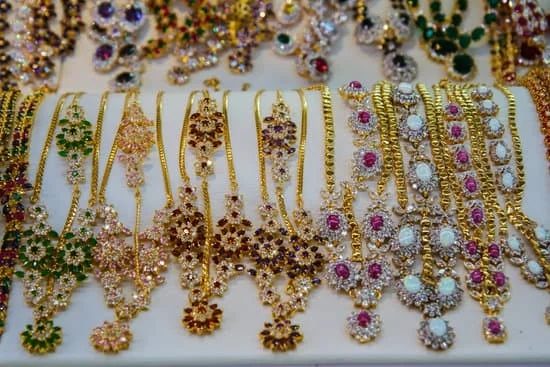Are you passionate about fine jewelry and have always dreamt of starting your own business in this glamorous industry? If so, you are in the right place. In this article, we will guide you through the essential steps on how to start your own fine jewelry business, from understanding the market to creating a strong online presence.
The journey to becoming a successful fine jewelry business owner begins with a deep understanding of the industry. From recognizing current trends to appreciating high-quality craftsmanship, it is crucial to familiarize yourself with the ins and outs of the fine jewelry business. This introductory section will provide you with an overview that sets the stage for your entrepreneurial venture into this enchanting world of luxury and elegance.
To help you embark on this exciting journey, we will explore key aspects such as research and planning, navigating legal regulations, building a unique brand identity, sourcing top-quality materials, designing and crafting exquisite pieces, as well as effective marketing strategies. By the end of this article, you will be equipped with valuable insights and practical tips to take the first steps towards establishing your own successful fine jewelry business.
The Journey to Starting Your Own Fine Jewelry Business
Starting your own fine jewelry business is an exciting and rewarding endeavor, but it also requires dedication, hard work, and a clear vision. The journey to starting your own fine jewelry business begins with passion and a love for creating beautiful pieces that will be cherished by others. Whether you have a background in jewelry design or are just starting out, the first step is to turn your passion into a viable business.
Identifying Your Niche
One of the key aspects of starting a fine jewelry business is identifying your niche within the market. This could be specializing in certain types of gemstones, unique designs, or catering to a specific target audience. Understanding what sets your jewelry apart from others will help you carve out a space for your brand in the competitive industry.
Educating Yourself
It’s important to educate yourself about the fine jewelry business as much as possible. This can include taking classes in jewelry design and metalwork, learning about different gemstones and their characteristics, and studying successful jewelry brands to understand what has made them thrive. Additionally, gaining knowledge about trends in the market and consumer preferences can help you make informed decisions when launching your own business.
Taking the Leap
Once you have honed your skills, identified your niche, and gained knowledge about the industry, it’s time to take the leap and turn your passion into reality. This could mean taking steps such as creating a business plan, seeking financing if necessary, and setting up your workspace.
Starting your own fine jewelry business requires courage and determination, but with careful planning and dedication, it can lead to a fulfilling career doing what you love. Starting a fine jewelry business may seem daunting at first glance; however with careful planning and attention to detail, this dream can become a reality for those who are willing to put in the hard work.
Research and Planning
Market Research and Analysis
Before diving into the world of fine jewelry business, it is crucial to conduct thorough market research and analysis. Understand the current trends, consumer preferences, and competitor landscape. Identify gaps in the market where your unique offering can thrive. This research will serve as the foundation for developing a business plan that outlines your target market, marketing strategies, and financial projections.
Creating a Business Plan
A well-structured business plan is essential for any successful venture. It should include an executive summary, company description, market analysis, organization and management structure, product line or services offered, marketing and sales strategy, funding request (if applicable), financial projections, and appendix with supporting documents. This roadmap will guide you through the initial stages of your business and also be crucial when seeking investment or financing.
Financial Planning and Budgeting
Starting a fine jewelry business requires careful consideration of finances. Create a realistic budget that covers the costs of sourcing materials, designing, production, marketing, sales efforts, staffing (if applicable), legal fees, insurance, rent (if entering a physical retail space), utilities, and any other operational expenses. Factor in an initial period of low or no revenue when estimating cash flow to ensure sustainability during the early stages of the business.
Additionally consider funding options such as personal savings, loans from financial institutions or investors. Understand the finances required to start your own fine jewelry business will help you avoid any potential pitfalls down the line.
By thoroughly researching and planning every aspect of your fine jewelry business before launch will set you on track for success in this competitive yet rewarding industry.
Navigating the Legalities
When starting your own fine jewelry business, it’s crucial to understand and adhere to the various regulations and requirements that govern the industry. One of the first steps you’ll need to take is to register your business with the appropriate local, state, and federal authorities. This may involve obtaining a business license, sales tax permit, and employer identification number (EIN) if you plan on hiring employees.
In addition to these basic legal requirements, it’s important to familiarize yourself with any specific regulations that apply to the fine jewelry industry. This may include compliance with the Kimberley Process Certification Scheme for sourcing diamonds ethically or adhering to hallmarking standards for precious metals. It’s also essential to have a clear understanding of consumer protection laws and regulations related to product labeling and advertising.
Finally, don’t overlook the importance of protecting your intellectual property in the form of trademarks for your brand name and logo, as well as design patents for any unique jewelry designs you create. Consulting with legal professionals who specialize in intellectual property law can help ensure that your business is legally protected from potential infringement issues down the line.
| Legal Requirements | Details |
|---|---|
| Business Registration | Obtain business license, sales tax permit, and EIN |
| Industry-Specific Regulations | Compliance with ethical sourcing standards and hallmarking requirements |
| Intellectual Property Protection | Trademarks for brand name and logo, design patents for unique jewelry designs |
Building Your Brand
When starting your own fine jewelry business, one of the most crucial steps is building your brand and creating a unique identity in the market. Your brand is what will set you apart from other jewelry businesses and attract customers to your products. To begin this process, it’s essential to define the core values and aesthetic of your brand. Consider what sets your jewelry apart from others and what story you want to tell through your designs.
Once you have a clear understanding of your brand’s identity, it’s time to develop a strong visual representation that will resonate with your target audience. This includes creating a compelling brand name, logo, color palette, and overall visual style that reflects the essence of your jewelry business. Keep in mind that consistency is key when it comes to branding – ensure that all aspects of your visual identity align with the message you want to convey.
In addition to visual elements, building your brand also involves crafting a compelling brand story that resonates with consumers. This could include highlighting the inspiration behind your designs, sharing the craftsmanship involved in creating each piece, or communicating the ethical practices upheld by your business. By connecting emotionally with potential customers through storytelling, you can build a loyal customer base that values not only the aesthetics of your jewelry but also the narrative behind it.
| Building Your Brand | Creating a Unique Identity |
|---|---|
| Define core values and aesthetic | Develop visually appealing representation |
| Craft compelling brand story | Connect emotionally with potential customers |
Sourcing the Best Materials
When starting your own fine jewelry business, one of the most crucial aspects is sourcing the best materials. The quality of your jewelry will significantly impact your brand’s reputation and customer satisfaction. Here are some essential steps to consider when sourcing materials for your fine jewelry business:
- Identify Your Design Requirements: Before sourcing materials, it’s important to have a clear understanding of your design needs. Whether you specialize in diamond engagement rings or gold statement necklaces, knowing the specific requirements for each piece will help you choose the right materials.
- Establish Relationships with Suppliers: Building strong relationships with reputable suppliers is key to obtaining high-quality materials for your jewelry. Research and network within the industry to find reliable suppliers who can provide you with consistent and top-notch diamonds, gemstones, gold, and other metals.
- Quality Assurance: Insist on quality certifications and ensure that the materials you source meet ethical and sustainable standards. This not only adds value to your products but also aligns with the growing consumer demand for ethically sourced jewelry.
In addition to these steps, staying updated on market trends and technological advancements in material sourcing can give you a competitive edge in the fine jewelry business. By maintaining a commitment to excellence in material selection, you can set a strong foundation for creating exquisite pieces that resonate with your target audience.
Designing and Crafting
When it comes to starting your own fine jewelry business, the process of designing and crafting your pieces is a crucial step in bringing your vision to life. Whether you have a background in jewelry design or are completely new to the craft, there are several important factors to consider as you embark on this journey. Here are some key steps to keep in mind as you begin the process of creating your own unique jewelry pieces:
1. Conceptualize Your Designs: Before beginning the actual crafting process, it’s essential to first conceptualize your designs. This involves sketching out your ideas, creating mood boards for inspiration, and gathering any reference materials that will help you bring your vision to fruition.
2. Select High-Quality Materials: The quality of materials used in fine jewelry is paramount. Whether you’re working with precious metals such as gold or platinum, or incorporating gemstones like diamonds or sapphires into your designs, sourcing the best materials is essential for creating high-end pieces that will stand the test of time.
3. Master Your Craft: If you’re new to jewelry making, it’s important to invest time in honing your skills. Consider taking classes or workshops to learn the intricacies of metalworking, stone setting, and other techniques essential for fine jewelry design.
By following these steps and dedicating time and effort to perfecting your craft, you can ensure that the jewelry pieces you create for your business are not only visually stunning but also of the highest quality.
Remember that designing and crafting exquisite fine jewelry takes dedication and patience. By staying true to your creative vision and continually refining your skills throughout this process, you’ll be well on your way to establishing a successful fine jewelry business.
Marketing and Sales
Once you have designed and crafted your fine jewelry pieces, it is crucial to focus on marketing and sales in order to reach your target audience and make profitable connections. Marketing and sales are essential components of any business, and the fine jewelry industry is no exception. With the right strategies, you can effectively promote your brand, attract potential customers, and ultimately drive sales.
One effective way to market your fine jewelry business is through targeted advertising. This involves identifying your ideal customer base and creating advertisements that specifically cater to their preferences and needs. Whether you choose to advertise through social media platforms, fashion magazines, or luxury lifestyle publications, it is important to craft visually appealing and compelling content that showcases the unique qualities of your jewelry pieces.
In addition to targeted advertising, building strong relationships with potential customers and industry contacts can also greatly contribute to the success of your fine jewelry business. Networking at industry events, collaborating with fashion influencers, or participating in trade shows are all effective ways to connect with potential customers as well as other professionals in the industry. By making authentic connections and showcasing the quality and uniqueness of your products, you can expand your reach and increase sales for your business.
Furthermore, when it comes to sales, offering exceptional customer service is paramount in the fine jewelry business. Providing a personalized experience for each customer by understanding their preferences and guiding them through their purchase can help build trust and loyalty.
Whether you sell directly from a physical store or online platform, ensuring that every interaction with a customer is positive will not only result in repeat business but also generate favorable word-of-mouth recommendations – an invaluable marketing tool in the fine jewelry industry.
Building a Strong Online Presence
In today’s digital age, building a strong online presence is crucial for the success of any business, including a fine jewelry business. Leveraging e-commerce can open up a world of opportunities for reaching a wider audience and increasing sales. When starting your own fine jewelry business, it’s important to understand the power of e-commerce and how it can be used to your advantage.
The first step in building a strong online presence for your fine jewelry business is to create a professional and visually appealing website. This is where potential customers will go to learn more about your brand, browse your products, and make purchases.
Your website should showcase the unique identity of your brand and provide a seamless shopping experience for visitors. It’s essential to invest in high-quality product photography to accurately display the beauty and craftsmanship of your fine jewelry pieces.
In addition to a website, utilizing social media platforms can also help boost your online presence and drive traffic to your e-commerce store. Platforms like Instagram, Facebook, and Pinterest are ideal for visually showcasing your jewelry collection and engaging with potential customers.
Building a strong following on these platforms can help increase brand awareness and drive sales. Engaging with followers through regular posts, stories, and promotions can also help foster relationships with customers and establish trust in your brand when they’re looking into how to start their own fine jewelry business.
Conclusion
In conclusion, starting your own fine jewelry business is undoubtedly a challenging endeavor, but with passion, dedication, and perseverance, it is definitely achievable. The journey begins with a deep understanding of the fine jewelry industry and a genuine love for crafting exquisite pieces that will captivate the hearts of customers. From conducting thorough research and planning to navigating the legalities and building a strong brand identity, every step is crucial in laying the foundation for success.
One of the most important aspects of starting your own fine jewelry business is sourcing the best materials. Whether it’s diamonds, gold, or other precious gemstones, ensuring that you have access to the finest quality materials is essential in creating jewelry pieces that exude luxury and elegance. Additionally, investing time and effort into designing and crafting unique pieces that reflect your vision will set you apart in the competitive market.
Furthermore, establishing a strong online presence through e-commerce platforms is crucial in reaching a wider audience and making profitable connections. This aspect of marketing and sales allows you to showcase your exquisite collection to potential customers around the globe.
With careful planning and execution in each stage of this process, you can pave the way for a successful venture into the world of fine jewelry. Taking these first steps sets you on track toward building your dream business in this thriving industry.
Frequently Asked Questions
How to Start a Fine Jewelry Business?
Starting a fine jewelry business requires careful planning and research. It’s important to understand the market, identify your target audience, and create a unique selling proposition for your brand. You’ll also need to consider sourcing high-quality materials, developing strong relationships with suppliers, and understanding the various legal and regulatory requirements for selling jewelry.
Is Selling Fine Jewelry Profitable?
Selling fine jewelry can be profitable if done strategically. High-quality, well-designed pieces can command significant prices, especially if marketed effectively to the right audience. However, competition in the industry can be fierce, so it’s essential to offer something unique or of high value to stand out and attract customers willing to invest in fine jewelry.
What Type of Jewelry Is Most Profitable?
The most profitable type of jewelry often depends on the current trends and consumer preferences. For example, in recent years, colored gemstones have increased in popularity as consumers seek more unique and personalized pieces.
Additionally, classic items like diamond engagement rings or luxury watches tend to retain their value and attractiveness to buyers over time. Ultimately, understanding your target market and staying updated on industry trends is key to identifying the most profitable types of jewelry for your business.

Welcome to my jewelry blog! My name is Sarah and I am the owner of this blog.
I love making jewelry and sharing my creations with others.
So whether you’re someone who loves wearing jewelry yourself or simply enjoys learning about it, be sure to check out my blog for insightful posts on everything related to this exciting topic!





